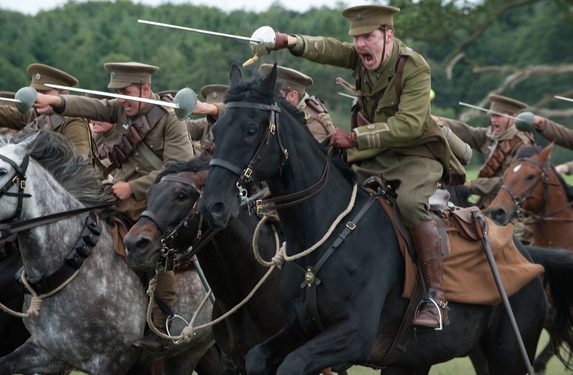To Die for the Cause
 Oh, what a mess our governmental and political world is, and many’s the normal citizen who is angry about it. Whichever side of the aisle you identify with, there’s plenty to feel irritated, impatient, or even irate about! Why? Because we feel threatened….our lifestyle, our income, and our freedom.
Oh, what a mess our governmental and political world is, and many’s the normal citizen who is angry about it. Whichever side of the aisle you identify with, there’s plenty to feel irritated, impatient, or even irate about! Why? Because we feel threatened….our lifestyle, our income, and our freedom.
From a physiological point-of-view, it’s no different than if we were still roaming the savannas of central Africa. When the lion roars, our adrenaline pumps, we feel intensely uncomfortable, and we feel very strongly compelled to do something to NOT keep feeling that. We make a quick, mostly unconscious “fight-flight” decision….throw a spear or climb a tree….driven by our anxiety and the most primitive part of our brain. In those primitive, natural surroundings, this response had a good chance of keeping us alive, as it has kept humans alive on Earth for around a million years, and the exact same process has helped animals survive for hundreds of millions of years.
However, even though the nervous system and physiological response to threat and fear is the same, there’s a big difference between a threatening predator and a modern day event. Unless you are in a genuinely life-threatening situation, the results of going into the fight-flight response are liable to be much less successful.
I read recently about a road rage incident. Both drivers stopped. One guy was so mad at the other he reversed his car and rammed it into the other car, then fled the scene, leaving his bumper and license plate behind! It wasn’t long before that guy was sitting in jail. The problem is, when he went on automatic into the fight-flight response, his logical thinking brain (cerebral cortex) which carefully considers problems and consequences…went on “pause” while the spear-throwing wildman took over. He might have felt for a minute or two that he had “killed the monster” and escaped with his life. But the results were not pretty, and a short while later it was pretty clear that he had not defeated any beast.
And it’s like that for most of us…not just in politics or driving, but also in work, friendship, and love relationships. We are easily “triggered” into feeling threatened, most often by an unconscious reminder of some very painful past experience. If you’d like to understand more how this happens, I explain more deeply here.
A client I saw yesterday was triggered into jealousy when with with her spouse and a female friend. She felt threatened and behaved rudely. What happened to the sensible, loving, rational wife? Gone! Meanwhile, her primitive brain took over and she was ready to spear some lions! Soon afterwards, she was regretful and embarrassed.
This can be a real problem! It can damage careers, destroy important relationships, cause you to kick the cat or an unmovable object, or accidentally leave your license plate at the site of a hit and run. And, in politics, getting angry really doesn’t help your candidate win.
There is another way. It first involves “deactivating” the fight-flight response. “When angry, count to 10 before you speak. If very angry, a hundred,” said Thomas Jefferson. Deep, conscious, slow-breathing for several minutes is an updated, more refined version of Jefferson’s advice. Another is to look slowly around the room from as far as you can turn in one direction to the furthest you can turn in the other direction. These are powerful methods to interrupt the primitive response…to help you avoid punching the other guy out or yelling at your spouse. They are only short-term, emergency solutions, but they can really help avoid saying or doing something you’d regret.
The longer term answer requires addressing and healing the wounds of past trauma, commonly childhood experiences. The jealous wife above recognized in her therapy that, after her brother was born, when she was aged 3, her Mother turned all her attention to the newborn and away from the young girl. She experienced this withdrawal of love and attention as extremely threatening. 30 years later, that response was stuck in her system so that the same old feelings of threat were triggered when her husband talked with another woman. Making that conscious connection, along with releasing from her body the tensions related to this childhood trauma, she is healing this primitive, reactive response which might have damaged her relationships.
This is the courageous, challenging, and rewarding work that I describe elsewhere in this website and in the poem below.
To Die for the Cause
by Paul Chubbuck
The hero mounts the hill!
Flags waving, music swelling,
guns blazing.
What a thrill!
Losing brothers, mates
midst blood and guts,
upward he climbs,
once more unto the breach,
until that final, fatal blow…
he falls,
and with him, also, our tears.
Strangely, our hearts soar.
Men emboldened, chests swelling,
Women swoon with quickened breath.
With this in our hearts,
we are willing to give up our lives
for our cause or country,
for our flag and fellows.
Show our young men where to enlist.
They are not lacking this brand of bravery.
But for those of us a little older,
something more difficult is asked,
not to die for our cause,
but to live for it daily.
So much harder, without stories and soundtracks,
sans speeches and podiums, guns or flags,
to dig daily towards our deepest knowing,
below ideas and doubt,
beyond judgment and belief,
down to the inner silence
seldom glimpsed, more rarely spoken.
Formerly we thought to seek it
merely wise and well-advised.
Now it beckons as urgent and vital,
though still not cheaply won.
The spiritual warrior too must find discipline
to release the drama, the righteousness,
the distraction or attention we could be getting elsewhere.
To come to know that caring, feeling, and being
could be enough to shift this relentless world,
could do what neither bombs, nor guns,
nor even words can ever do.


